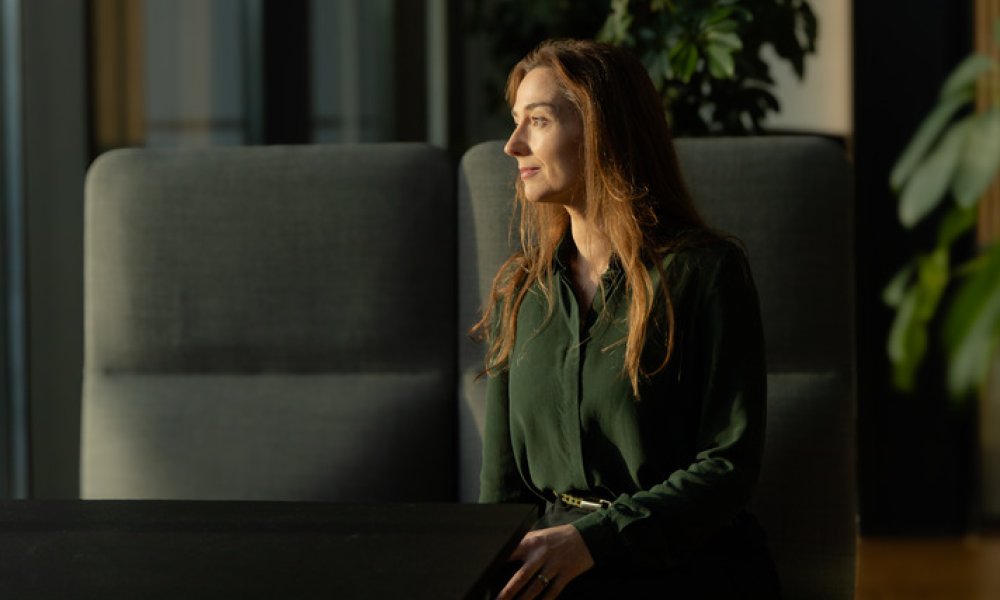At the close of the year, we sat down with Storebrand Head of Human Rights and Senior Sustainability Analyst, Tulia Machado. In the interview, Tulia shares the story of growing up in the early years of the new Spanish democracy, with parents who were democracy activists, and learning the value of human rights early on. She sheds light on the challenges of working in the field of human rights and explains why it is a crucial area of risk management, now and the years ahead.
You’re a senior sustainability analyst and are responsible for human rights at Storebrand Asset Management. Can you tell us what issues are included in your field of work?
Well, I work within the sustainable investment team, where we have people with competencies in a variety of fields. I focus on all aspects of human rights, including labour law, indigenous peoples' rights and digital rights, as well as international humanitarian law, to name a few areas.
Practically speaking, how do you work with asset management?
My work includes developing our policies and procedures, conducting human rights due diligence of our portfolios, pre-screening of companies for portfolio construction, based on our policies. In addition, I evaluate the ongoing information we receive from our data and information providers and apply our proprietary method of human rights assessment.
We also conduct dialogues with companies, on various issues related to human rights, to influence them towards improving their corporate behaviour. If the dialogues don't yield results, we present our recommendations for action to our investment committee, which may then consider divesting from the company, as a last resort.
You’ve got an interesting background: a law doctorate, a Texas State Attorney license and a master's degree in international relations and development. How was your interest and commitment to the issues you work with today, shaped by your professional and personal background?
My interest in the issues I work with today has been shaped by both my professional and personal experiences. My parents were both democracy activists, and I was born at the very end of a military dictatorship – General Franco's rule in Spain. So, growing up in the new Spanish democracy, I learned from my parents, up close and daily, the value of human rights. This later led to me studying law with a focus on human rights.
“Growing up in the new Spanish democracy, I learned from my parents, up close and daily, the value of human rights..”.
So, you got introduced to these issues really early on in your life. And where did you take that next? Did you work with human rights before you joined Storebrand?
Yes, in Texas, I also worked with providing legal assistance to asylum seekers. This increased my awareness of issues surrounding these people's rights, and I learned a lot about their personal background - their histories. Many of these people had fled conflicts and natural or economic catastrophes. So that also really connected the dots for me, between human rights and other aspects of sustainability.
It seems that the number of major conflicts in the world is on the rise right now, and we read about it every day in the news. How does it affect your work?
Yes, data from the United Nations shows that the number of armed conflicts has increased around the world in recent years. Many products and services, including weapons but also in many other categories, are still being supplied to states that use them to commit a variety of human rights violations, including potential war crimes and crimes against humanity.
This means that we must strengthen our human rights due diligence work – and we are therefore conducting more and more dialogues with companies in Conflict Affected and High-Risk Areas (CAHRA), and are also faced with more decisions about divestment of those companies that may not be willing to change their behaviour.
The work with CAHRA companies is something that we have been doing since 2009. But for some, this is new. With conflicts increasing around the world, more and more investors now understand that this is a risk they need to take into account in their portfolios, which has led to several cooperation initiatives for investors in this area. We are pleased to be part of these initiatives that increase our opportunities to be involved and influence and thus contribute to raising the bar when it comes to corporate behaviour.
“…With conflicts increasing around the world, more and more investors now understand that this is a risk they need to take into account in their portfolios…”
Can climate or nature solutions lead to unintended human rights problems - or even escalate into conflict?
Other types of conflicts, which are non-armed ones, but can also become violent, are linked to the transition to net-zero emissions. There is a rush for resources, and this is resulting in pressure on indigenous people and their territories.
In recent years, we have had extensive engagement and escalations with companies in the wind power sector. Renewable energy is obviously a significant need, but naturally it should not come at the cost of people’s right to their habitats and their way of life.
Many sustainability issues are characterized by a focus on ESG focus data-driven reporting, but how are activities related to human rights measured and how do you measure the results of our efforts in these issues?
Managing this risk is not just about quantitative analysis: it’s also about qualitative analysis. Negative impacts on human rights are not as easy to measure as carbon dioxide emissions into the air. This does not mean that the problem does not exist or has real consequences, such as the forced displacement of communities or the impact on our children's health through social media. Such analyses require human rights expertise, either in-house or from external experts, to ensure that we have an accurate assessment of these risks in line with the UNGP1, the Norwegian Transparency Act and EU regulations.
Even when there is data, it’s still very different from environmental issues for example, because even “just” one person killed is still one too many.
What are the biggest misconceptions investors have about how to manage human rights risks in asset management?
It's a more common risk than many people realize – look at Apple, for example, which has been sued for its involvement in mining in Congo, and the controversy surrounding Tesla over the right to join a trade union, which is also a human right. CS3D2 and CSRD3 now also makes this a relevant risk for many large companies operating in the EU. Ensuring compliance with human rights is no longer a "nice to have" - it is a "must have".
What should investors know about the current state of human rights when it comes to their investments?
Yet, it’s one of the areas of risk that many major companies are least prepared for. However, many of them are now making great efforts to familiarize themselves with, and become more competent in managing, these risks, as well as the increased regulatory risk.
“…It’s one of the areas of risk that many major companies are least prepared for…”
The technology sector is evolving rapidly and is a central part of many investors' portfolios. At the same time, it is a sector that is involved in many controversial activities related to human rights that have to do with, for example, privacy, manipulation, disinformation, censorship, oppression and labour law. How does one navigate this dilemma?
First and foremost, investors need to educate themselves about new technologies in order to understand their potential implications for human rights and society. Then they can make a better assessment of the risks they are exposed to by investing in these companies and enable a dialogue with the companies to reduce these risks.
There are emerging regulations from the EU that can serve as a guide for investors. There are also guidelines from civil society and UN agencies.
However, all of this can be quite overwhelming. We have therefore, together with other investors, engaged in several initiatives where dialogues are conducted with the technology sector on these issues with the aim of achieving stronger impact and increased knowledge exchange. Within these initiatives, collaborations have also been initiated with experts in these complex issues as well as civil society.
Storebrand Asset Management is involved in, and works with, several different initiatives in your area. Which initiatives do you think will have the greatest impact on human rights issues?
We have been involved in many human rights initiatives and their focus areas cover a wide range of issues. The Investor Alliance for Human Rights has a strong focus on forced labour but also on other issues such as digital rights and CAHRA, PRI Advance5 focuses on Just transition4, CAHRA and indigenous peoples and workers’ rights in the supply chain, to name a few examples.
Another example is the Platform on Living Wages Financials, which focuses on living wages and living incomes in the textile, food and agriculture sectors. The World Benchmarking Alliance (WBA) focuses on AI ethics and just transition for oil and gas companies. We are also part of the Largest Technology Companies in the World initiative, which is led by the Swedish Council on Ethics and focuses on many of the digital rights we discussed above.
My view is that all these initiatives are making progress. Some more than others, depending on the sector and the companies' openness to having a dialogue with investors. However, I wouldn’t say that any one of these initiatives would have more impact than the others. Each plays its own important role, in different ways and within different areas.
These are really tough issues you work with, and after listening to your answers and gaining a deeper understanding, it feels quite dark. Where do you get your drive and energy to work with these questions, which I can imagine sometimes become quite a burden?
The situation looks absolutely bleak, yet it’s also uplifting to be able to contribute to solving these massive challenges.
It is also rewarding to see the increasing number of investors working on social issues. A few years ago, there were extremely few of us in the financial sector working on these matters, but today there are many cooperation initiatives linked to human rights. Civil society organisations have also begun to see the value in joining forces with investors, as we often have a common goal, even if we do not use the same methods to achieve it. Working with like-minded investors and civil society organizations and seeing the progress that is being made among the companies gives me energy.
What will you have on the agenda for next year? Are there any particular issues that will be the focus?
Unfortunately, in 2025 we believe that armed conflicts will continue to exist on a significant scale. As asset managers we will need to continue to focus on CAHRA and continue in the same direction as in recent years to ensure robust supply chains and a just transition.
Technology development is advancing extremely rapidly, for example with the revolution in AI and the development of the digital world with tools for virtual reality. Yet, there are few or no safety nets in place to ensure that human rights are protected. All of this is happening in a sector that makes up a significant part of our portfolios and has historically been a driver of growth in financial markets. This means that we need to invest even more time and effort in these matters.
“…Technology development is advancing extremely rapidly, for example with the revolution in AI and virtual reality…..Yet, there are few or no safety nets in place to ensure that human rights are protected.
Finally, is there anything that people can do on a personal level if they want to help or get involved in this area?
It is possible to use your power as a consumer to pressure companies – this worked, for example, with Nike and the so-called "sweatshop cases" in the 1990s. You can also interact with brands and express your opinion, engage in NGO campaigns, or simply boycott brands that act in a way that they do not believe supports human rights.
It's also important to be cautious about buying products that appear to be too "cheap to be true" because it's usually an indication of poor working conditions, or perhaps worse, forced labour.
People with pensions can express their opinions by asking their pension managers not to invest in companies that don’t respect human rights.
If you want to help even more concretely, I’d suggest that you register as a member of – and help volunteer for – one of the many civil society organizations that work for human rights.
----------------------------------
Definitions
1) UNPG (United Nations Guiding Principles Reporting Framework) is the world’s first comprehensive guidance for companies regarding their reporting on how they respect human rights.
2) CS3D (Corporate Sustainability Due Diligence Directive) aims to foster sustainable and responsible corporate behaviour in companies’ operations and across their global value chains.
3) CSRD (Corporate Sustainability Reporting Directive) introduces a mandatory set of rules on European sustainability reporting.
4) Just transition is defined by the The International Labour Organization (ILO) as: “Greening the economy in a way that is as fair and inclusive as possible to everyone concerned, creating decent work opportunities and leaving no one behind”. A just climate transition, is one that; involves a range of measures to secure workers' rights and decent work when industries and labour markets adjust; and become climate-friendly and environmentally sustainable.
5) PRI Advance is a Principles of Responsible Insurance (PRI)-led collaborative initiative where institutional investors aim to protect and enhance risk-adjusted returns by advancing progress on human rights through investor stewardship.







